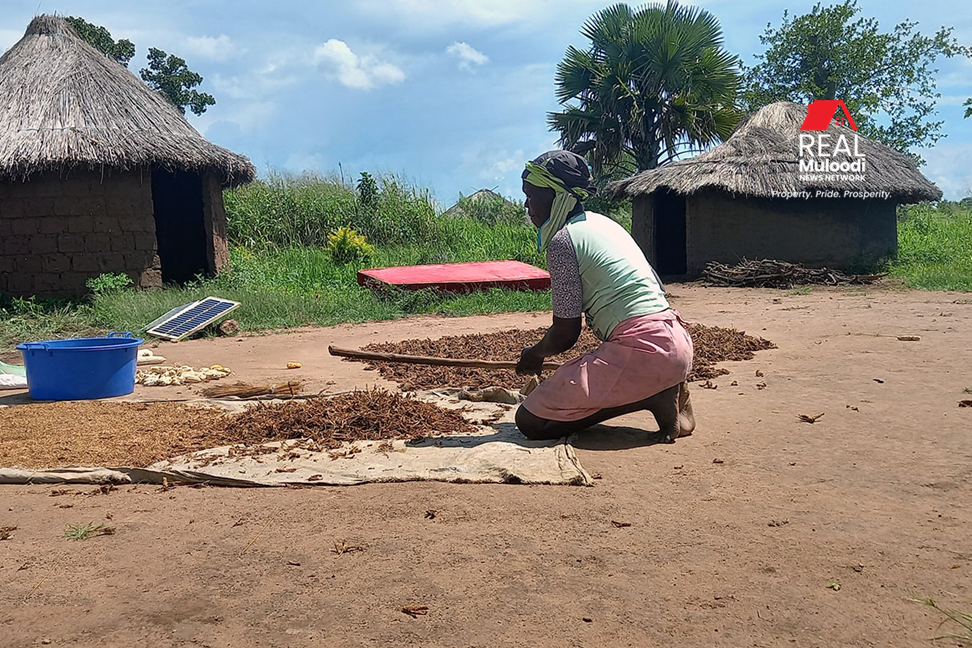UGANDA, Tororo | Real Muloodi News | The story of Aidah Aboth, a widow from Ngeta “B” cell in Tororo District, illustrates the ongoing challenges widows face with alleged land grabbing in Uganda. Aboth a 90-year-old widow, a mother of eight, has been entangled in a dispute involving her late husband’s property. This has drawn attention to the broader issue of land rights violations, particularly affecting vulnerable groups.
Aidah Aboth was displaced from her 12-acre matrimonial land following her husband’s death. She alleges that her in-laws, in collaboration with members of the Area Land Committee, illegally transferred the land ownership. Aboth fled to live with her daughter after facing intimidation and harassment.
According to her account, the land was legally inherited, but the family members have allegedly used physical threats and legal maneuvers to evict her. Despite her appeals to local leaders and legal authorities, the dispute remains unresolved.
Aidah Aboth has appealed to the president and other relevant authorities to help her reclaim her land. She expressed concerns about the traditions that prevent her from being buried at her son-in-law’s home if she dies while living there.
In one incident, Aboth claims she was forced to flee her home after individuals entered the property without notice.
“We lived peacefully until my husband passed away. Now, the people I called family have turned against me,” she said. Her children, who rely on the land for their education and daily sustenance, have also been affected.
The situation in Tororo is not unique. Land grabbing is a growing issue in Tororo and Butaleja districts, particularly affecting widows, often exacerbated by a lack of formal documentation and complex inheritance laws. Cases often involve family members and local authorities taking advantage of legal and societal gaps to strip widows of their inheritance.
Women, especially widows, face significant challenges in asserting their rights due to cultural norms and limited access to legal resources, thus left homeless and without a means to support themselves.
A local government official, speaking anonymously, stated that cases like Aboth’s highlight gaps in protecting widows’ land rights.
“Widows are particularly vulnerable because they often lack the legal support needed to secure their property,” the official noted.
The broader issue stems from cultural norms that tie women’s land rights to their relationships with men. When a husband dies, widows often face disputes over land ownership, sometimes leading to displacement. Legal protections exist, but enforcement is inconsistent. Critics argue that these measures are not reaching the most vulnerable populations.
Community leaders and advocacy organizations are stepping to support widows and orphans facing land-related challenges. They provide legal aid, mediation, and education on land rights. A representative from one such organization emphasized the need for systemic reforms.
“Without strong enforcement of land laws, these cases will continue to rise,” the representative said.
For instance, Mrs. Basereda Achom, a widow from Malaba Town Council, successfully reclaimed her four-acre land through a court ruling. Achom described the ordeal as traumatic but expressed relief at the outcome.
Other widows, like Joyce Adengero from Osukuru Town Council, continue to struggle. Adengero has faced disputes with her late husband’s relatives, who claimed the ancestral land must be subdivided. She argued that boundaries were established while her husband was alive and questioned the sudden claims after his death.
Organizations such as the Uganda Community-Based Association for Women and Children Welfare (UCOBAC) have initiated dialogues to raise awareness about women’s land rights. These efforts address cultural and legal challenges through community engagement and advocacy.
Enfulansi Kafuko, a sub-county councilor in Butaleja District, highlighted the persistent belief that women lack authority over land, contributing to the problem. She noted that men often assert control over family property without involving women, which undermines their rights.
Another advocate, Lukiya Buya, emphasized the importance of securing land rights for women to foster economic empowerment and social stability. She explained that land ownership provides women with security, livelihoods, and dignity, making it essential for their well-being and independence.
Efforts to address land disputes in Tororo have included community dialogues and government-led initiatives to encourage formal land registration.
Aidah Aboth’s case remains a stark reminder of the struggles faced by widows in Uganda and the importance of addressing systemic issues that leave vulnerable individuals at risk of losing their homes and livelihoods.
READ MORE LIKE THIS:
The Struggle of Ugandan Widows: The Right to Inherit Property
Principal Judge Advocates for Adopted Children to Inherit Property



